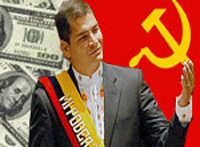USA fails democratization of Ecuador
 Another publication of WikiLeaks has worsened the already difficult relations between the U.S. and Venezuela's ally Ecuador. On April 6, President Rafael Correa expelled the U.S. Ambassador Heather Hodges and accused Washington of conducting subversive activities. In particular, of the fact that the Americans were recruiting spies among the Ecuadorian military and police.
Another publication of WikiLeaks has worsened the already difficult relations between the U.S. and Venezuela's ally Ecuador. On April 6, President Rafael Correa expelled the U.S. Ambassador Heather Hodges and accused Washington of conducting subversive activities. In particular, of the fact that the Americans were recruiting spies among the Ecuadorian military and police.
The reason for the escalation was the recent publication on WikiLeaks of the correspondence of American diplomats from 2009, referring to the widespread corruption of the Ecuadorian security forces.
Minister of Foreign Affairs of Ecuador Ricardo Patino asked the U.S. ambassador to explain why she was interested in "quotations" for Ecuadorian police. However, he claimed that he did not receive a clear answer. As stated by the head of the Ecuadorian Ministry of Foreign Affairs, the Government of Ecuador decided to consider this woman a persona non grata. "We asked her to leave the country as soon as possible."
However, Ricardo Patino stressed that this incident does not mean a breach in the diplomatic relations with the U.S., it clearly reflects the nature of the relationship of Washington with Venezuela's satellite countries.
In addition, in terms of the degree of anti-Americanism in the Western Hemisphere, Correa is actively and not without success fighting for the second place with Chavez. Since coming to power in January of 2007, he has been tirelessly making unpleasant for Americans statements that are often supported by actions.
One example is the nationalization of certain industries, including oil, that affected the interests of American oil companies. In addition, he abandoned the idea of a free trade zone with the United States and expelled the American military from Manta base in western Ecuador they had been renting.
He also had his opinion about American presidents. For example, former U.S. President George W. Bush was described by him as a "remarkably stupid man." Thus, Correa is one of the most prominent followers of Chavez's block in a fight with the U.S. hegemony. It is also noteworthy that the relations of Ecuador with the main U.S. satellite in the region, Colombia, seem to be rather tense.
Judging by the activity of the opposition, Americans are waiting for the opportune moment to overthrow it. The attempts to overthrow it through democratic means have failed. 2009 election showed that the majority of Ecuadorians remain to be the supporters of his policies.
Then his opponents have taken a different route. In late September of 2010 mass protests began in Ecuador that were supported by some of the security forces. In addition, the police, unhappy with Correa's plans to cut their salaries, played a significant role in the revolt. The plotters nearly got lucky when the security forces seized the airport of the capital Quito and a few military bases along with the presidential plane. After that, the rebels broke through to the downtown of the capital and surrounded the presidential palace.
On September 30 Correa decided to personally meet with the protesters. However, they clearly were not inclined to conduct a constructive dialogue and began beating him.
There are several versions of the events that followed. According to one of them the opposition took President Correa to a hospital, where he spent several hours under arrest. According to the other one his supporters helped him to escape. After that, during the bloody clashes in Quito and Guayaquil, the country's largest port, in early October the coup was defeated.
The commander of the armed forces of Ecuador Ernesto Gonzalez played a major role in suppressing the revolt, remaining loyal to his president.
According to Quito's official version, the conspiracy was traced to former president Lucio Gutierrez, who lost to Correa in 2009 elections. Of course, the "outside forces" were behind all this. That is, the Americans, who allegedly financed the rebels of Gutierrez.
Although the White House after the failed coup has also supported this ally of Chavez, this reaction of Obama could not deceive anybody. It is hard to imagine that Washington sincerely wished well to one of the main followers of Chavez who at times was no less adamant than Hugo. Therefore, the theory that the coup was directed by Americans does not look that unrealistic.
The United States that traditionally considered Latin America as its "backyard" made the overthrow of unwanted leaders its usual practice. The number of interventions, coups and assassinations of political figures they have organized in the region reaches dozens. The most publicized was the overthrow in 1973 of Chilean President Salvador Allende, carried out with active support from the CIA.
In 2002, Americans attempted an unsuccessful overthrow of Correa's best friend, Venezuelan President Hugo Chavez. The U.S. government welcomed the coup prematurely. In 2008, the pro-American forces unsuccessfully tried to overthrow another Chavez's ally - Bolivia's President Evo Morales.
Therefore, the nervous, as may seem at first glance, reaction of Correa towards the U.S. ambassador is understandable. Diplomatic envoys of the most democratic country in the world played a key role In all pro-American conspiracies. In any case, the interest of the U.S. ambassador to the financial situation of the security forces of the allied Chavez seems strange. What do the Americans have to do with purely internal Ecuadorian issues?
Sergei Balmasov
Pravda.Ru
Subscribe to Pravda.Ru Telegram channel, Facebook, RSS!





